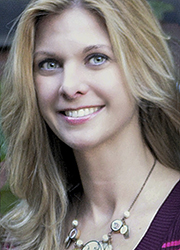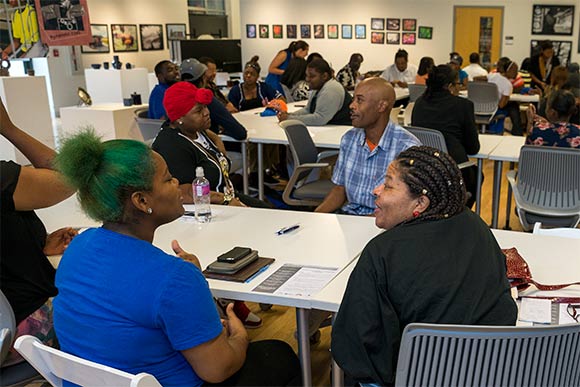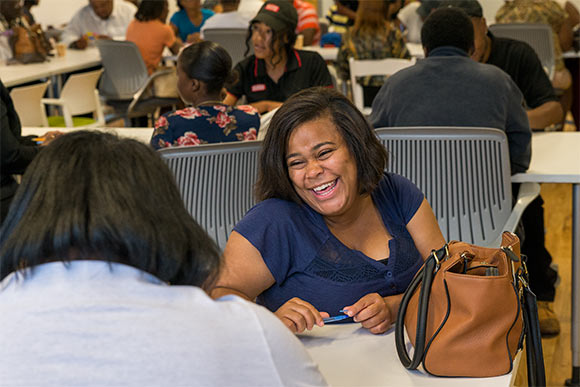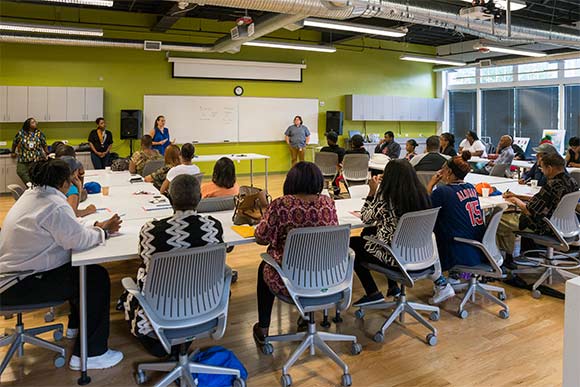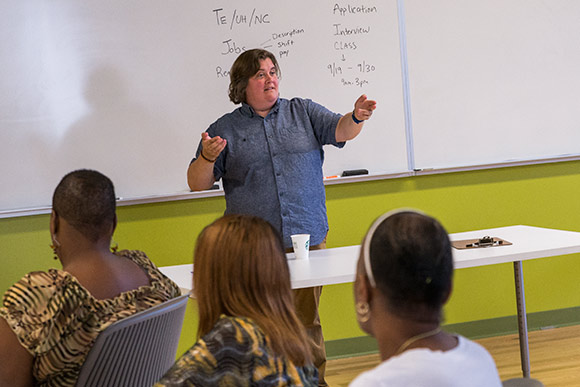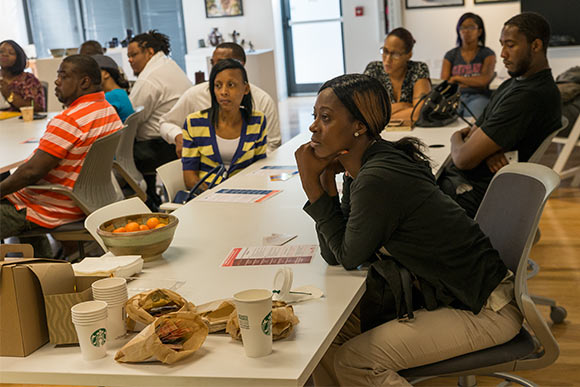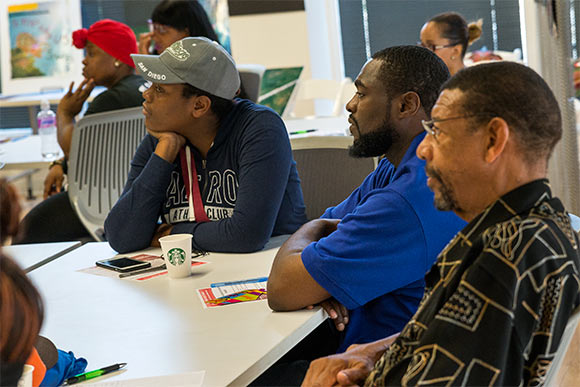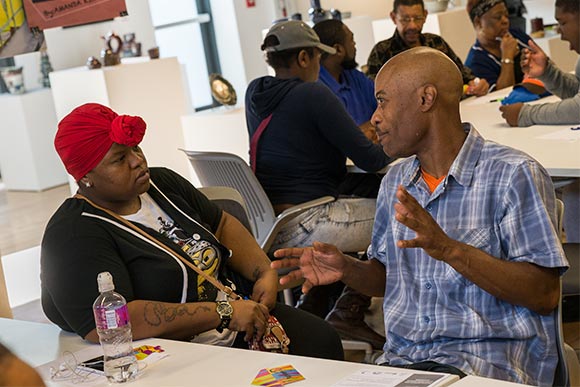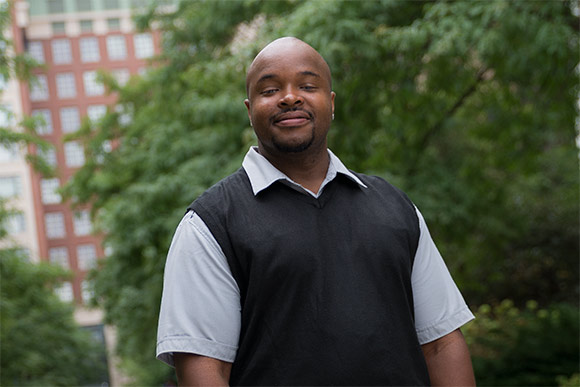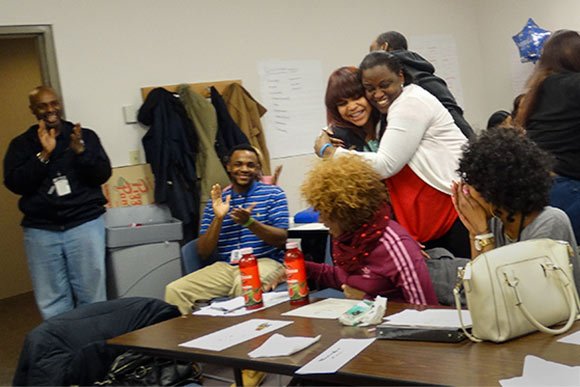Innovative job program helps community members Step Up
Over the next several months, this series of stories, "Grassroots Success: Awakening the Power of Families and Neighborhoods," will explore how meaningful impact on our communities grows from the ground up. Support for "Grassroots Success" is provided by Neighborhood Connections.
This week, Fresh Water takes a closer look at Step Up to UH, a program that offers hands-on training to prospective local employees, preparing them to apply for jobs at University Hospitals and offering ongoing support to those that hire on.
Developing Skills, Taking Challenges
Dan Morgan had been employed in a factory production position at Nestles Prepared Foods for just under three years when company downsizing in November 2014 resulted in his lay-off.
With three children to support, he was job-hunting in a county building when he saw a flyer for Step Up to UH.
Step Up, the neighborhood jobs pipeline, began as a pilot program in 2013 after a survey of Neighborhood Connections’ Neighbor Up members showed that approximately 30 percent could not find a job in their neighborhood that paid a living wage. Neighborhood Connections, University Hospitals and Towards Employment partnered to rectify the problem.
“It is a way for us to increase the number of people we are hiring and retaining from our surrounding neighborhoods of Case Medical Center,” Debbi Perkul, senior workforce development professional at University Hospitals Health System, explains.
Tobacco and drug free residents of Greater University Circle (Glenville, Hough, Fairfax, Central, Buckeye-Shaker, Little Italy, University Circle, and East Cleveland) who have a high school diploma or GED and a criminal-free background who are seeking employment are encouraged to participate in a two-week unpaid training course at Towards Employment that prepares Step Up candidates for interviews and specific jobs with skill development classes.
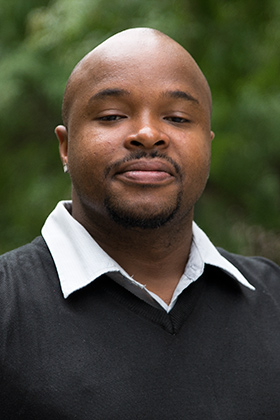 Dan MorganAccepted into the pre-employment program, Morgan says he learned job skills, personal skills, and most importantly, transferable skills.
Dan MorganAccepted into the pre-employment program, Morgan says he learned job skills, personal skills, and most importantly, transferable skills.
“The biggest challenge while there were the mock interviews,” he says, “but they helped me a lot in the long-run. They taught me that eye-contact was most important to make you look attentive and personable.”
The program delivered for Morgan, who is currently employed as an environmental service worker for University Hospitals.
”It’s been good,” he says. “There have been a couple obstacles with personnel along the way, but they taught us in the program that you’re going to get that anywhere. They taught us how to work through it, and it must have stuck in the back of my head.”
Now with a fourth child on the way, Morgan is searching for a more advanced position within UH. He also just completed his first semester at Cuyahoga Country Community College (Tri-C) on his way to his dream of becoming a certified public accountant.
He says the skills he learned through the Step Up program will “most definitely” help him in his future field, and adds that he appreciates the people who helped him in the program and continue to reach out to him even now that he’s on his own.
Stepping Up
Towards Employment advancement coordinator Staci Wampler reports the program has held 20 sessions, resulting in more than 150 people finding job placement. Towards Employment gets the job requisitions prior to seating each class and typically selects three times more students than job openings. The organization works closely with UH and the managers of the hiring departments to learn who are the best employees for the specific jobs.
Cleveland State University (CSU) is the evaluation and data collection partner for the program, tracking outcomes that they update every quarter. They also collect data on where employees live, indicating how many remain in the neighborhoods after hiring on.
The Step Up program mirrors the process of getting hired at UH at large, beginning with a phone interview. During the two-week training, candidates scan in and out daily in a work simulation.
“We look at competency and skills and address a certain gap in the skill set,” says Chelsea Mills, Towards Employment's director of business services. “It’s an opportunity to learn about how to talk about transferable skills and how their skills translate. It’s an opportunity to get that foot in the door.”
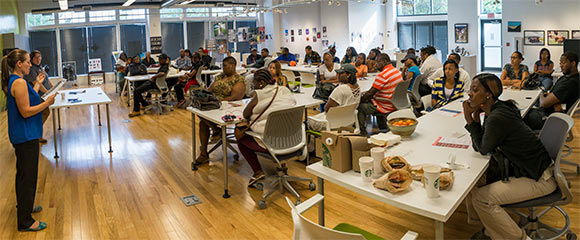
“We work on communication and customer service in a hospital setting tailored to that specific job,” adds Wampler. “We can even bring in a manager or a person who has been through the program to explain what a day on the job is like.
“The biggest hurdle [for potential candidates] is not enough access to knowing what a resume is supposed to look like. We help them with how to talk about their skills and have confidence in their abilities.”
Another significant portion of the training focuses on getting along with difficult people, which is something everyone in the work force contends with. To help work through such challenges, Towards Employment also provides six months of retention career coaching after program attendees are hired. The coaching works; Step Up to UH has an average retention rate of 80 percent after one year, which is higher than UH’s internal retention rate. After one year, employees are eligible for advancement, and one third of those who have gone through the program have done just that.
Walter Wright, program manager for economic inclusion at CSU's Maxine Goodman Levin College of Urban Affairs and interim executive director of NewBridge Cleveland Center for Arts & Technology, explains the beginning of the pre-vetting program: “UH needed seven people so they asked for 14 applicants; they typically had a 12 to one hiring history. Towards Employment put out flyers, talked to people, screened out smokers and drug users, did background checks, and gave people the job information to weed out those unwilling to do the job. Then they followed-up by phone, prepared them to submit an online resume, interview skills, etc. They had a high level of success.
“They ended up with 13 people in the program. UH said they were the most motivated, well-qualified batch they had ever interviewed and hired all of them.”
Wright says the program he's dubbed ‘a pipeline to the pipeline’ is creating opportunities that basically level the playing field.
“Living in a distressed city in survival mode, [the residents] have developed a different skill set that may actually hurt them in trying to find a job,” Wright explains. “This program is deliberately training a group of people in the community who would typically fail in these opportunities.
“We are not advantaging them over people from more suburban communities or other parts of Cleveland,” he continues. “We’re giving them access to some of the things they are lacking. They are still knocking on the same door, this program just allows that door to be open to them when it wouldn’t have before.”
The program extends into the job as well. A manager can call the employee’s Step Up job coach if an issue arises, and Toward Employment will work to solve it.
“Typically a manager would not take the time to work through a personal problem with an employee,” Wright said. “It’s a new model for them to try to retain people.”
He said that UH was so impressed by how well the models worked for them they have begun expanding them into other hiring practices.
Perkul agreed that UH benefits from hiring a local workforce who want to develop their careers at the hospital.
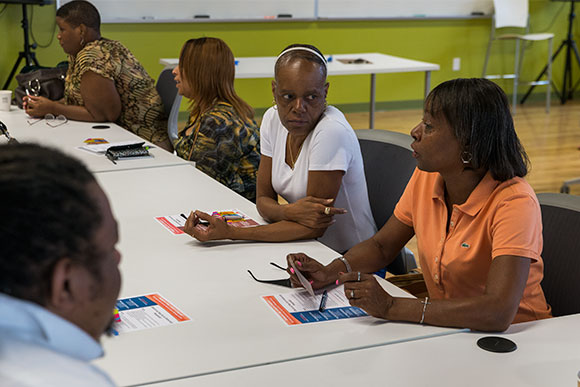
“We have highly engaged employees who love working at UH, and we feel a deeper connection to our surrounding community,” she says. “We encourage our employees to continue to build their careers at UH, and provide resources and benefits to help them along that path. We hope the ongoing career development and support adds to growing family stability and wealth building in our community, and improves the health of our surrounding neighborhoods and entire city.
“We are continuing to integrate Step Up to UH into the fabric of our organization, and look forward to wrapping the best elements of the model into the culture of UH.”
Creating a Tighter Bond
The jobs filled via the program have primarily been in environmental and nutrition services at University Hospitals, where staff earn a competitive hourly wage with a local employer that is committed to staff advancement.
However, the program has recently ventured into patient care assistant positions as well. In a collaborative program, students are involved in hybrid training with classes at Tri-C and clinic work on the floor at UH.
Towards Employment officials also note that many qualified residents are certified medical assistants, but lack the experience to get a job, so they piloted a Step Up to UH program to bridge this gap. Supervisors are currently evaluating it, as there are a lot of open local positions in this field. Wright says there are conversations on possibly implementing similar programs at Cleveland Clinic and MetroHealth System.
“This would not have happened if we hadn’t done the Step Up program,” says Wright of the expansion.
University Hospitals also fosters employee resource groups where employees can volunteer in the community. The Greater University Circle group, which includes Step Up participants, has 15 people meeting more regularly than required, and they have self-selected youth employment, housing, and education as their community goals.
“It creates a tighter bond between employees, to increase productivity, loyalty, and a sense of being a part of something,” Wright explains.
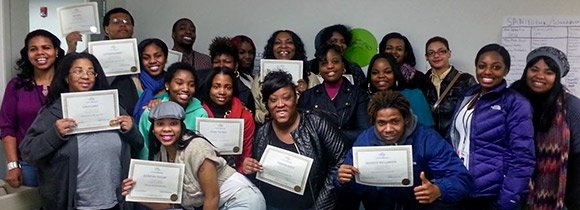
Wanting Something Better
Two months after graduating from Success Tech Academy High School, Erik Strong was wondering what to do next.
”I wasn’t in school yet, and I wanted something better than sitting around at home everyday,” he says.
His mom told him about Step Up to UH. After spending two weeks at their pre-employment class, he was hired as an environmental service worker at the hospital in 2013.
“The biggest challenge for me during the class was dealing with different people,” says Strong. “I’m not much of a social person.”
The program taught him skills to overcome these shortcomings, though.
“If I would have went to the interview without the stuff they showed me, they wouldn’t have hired me," he says. "I would have come off anti-social and a little rude.”
However, with his new skills, Strong was promoted to a material handler position in December 2015. He is also attending classes at Tri-C East in architecture and robotic design.
“Right now, this [job] is just a way to put money in my pocket and finance myself so I don’t have to rely on my parents too much,” explains Strong. “Building robots has always come easy to me… [Step Up to UH] gave me the tools to help me talk to different types of people. I would never be able to network without what they taught me.”
Wampler enjoys hearing the success stories that come out of the program she has watched grow since its inception.
“It has been fantastic in regards to the number of people we have reached,” she says. “[The best part is] watching the graduates – who are happy in their new work and are able to support their families – come back and talk about how great the program is. They pay it forward, refer friends, and keep the ball rolling.”
